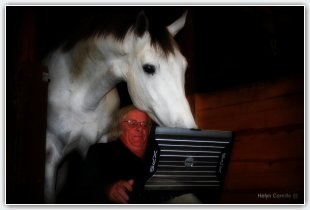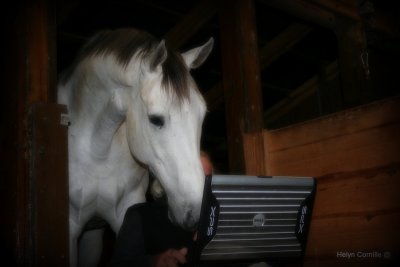Thoughts IV
Chazot Thoughts
IV
Jean Luc Cornille

"Science allows us to look at natural processes with a different eye and to understand how things work, (Marc Kaufman)
Tonight I came back from my training session feeling simultaneously good and tired. I held my neck outside of my stall, but I was not really looking outside. I was looking inside myself thinking about my body. Manchester asked, hard work? I told him not really; we stayed at the walk the entire training session. Manchester immediately asked; something wrong? Usually he does that when he wants you to work very specific muscles groups. I confessed that yesterday, as I was rolling energetically in the sand I overdid and I did not feel very comfortable for the rest of the day. That evening I was glad that he did not ask too much. We started at the trot and he noticed that when he was changing the diagonal of his rising trot, I protected myself for a few strides. I don’t think that I was lame but I was cautious. He walked, let me rest and asked for a few longitudinal and lateral flexions. He then stopped thinking you hurt yourself again. His mind was on a quote that he feels does fit me very well. “Experience enables you to recognize a mistake when you make it again.” (Franklin P. Jones)
Manchester added, as if he could read my mind, and today you did the whole training session at the walk. And tonight you feel like your whole body has been worked intensively. I wondered how he knew all that but then he told me. When I first started my reeducation, I stayed two months at the walk. I had been submitted to numerous therapies but once set in motion I did what we are all doing instinctively, I protected my problem. I sheltered my left stifle extending my left hind limb without using my knee extensors. I have done that since day one and this is why not one of the previous approaches ever reached my problem. My protective reflex mechanism did not fool him. He knows that we can execute exactly the same movement using different muscle groups. In fact, talking about my left stifle I can feel that he was thinking about a study that he had read earlier on. He had a sentence in his mind. If I remember right, it was something like, “A visually identical hind limb extension in late stance may be accomplished by only hip extensor muscles, only knee extensor muscles or any combination of these.” (Liduin S. Meershoek and Anton J. van den Bogert. Mechanical Analysis of Locomotion.) I guess, late stance means the end of the support phase since it is the moment where we are using these muscles. He played with my balance, slightly changed my body posture. He focused on the longitudinal flexion of my spine and I realized then that I was using my knee extensors. I stop immediately thinking, this is going to hurt, but it did not hurt, so I tried again. Little by little, my muscles became stronger and when he asked for the trot I was not too worried about it. He did not really ask me any specific movement. He does not think that repeating a movement can educate our body. He is right about that. For years I executed many movements without ever using my knee extensors muscles on the left side. My riders were focusing on neck posture and other details and meanwhile, I was executing the move protecting my problem.
Well, this whole story looks very much like what we did today and I reacted like Manchester, I halted when I was worried about the pain. Each time, he waited a few minutes and asked me to move forward into slightly different body coordination. I could not tell him exactly where I was uncomfortable because this was not very clear to me. When I realized that he was not disturbed by me stopping, I used it as an indication. I think this was helpful. He was listening to my body language trying a different coordination or nuance. He created lateral flexion to the left and then to the right changing the longitudinal flexion of my spine each time I was becoming a little tense. At one moment, I felt quite comfortable. I guess I was clear in my reaction because he recreated over and over the same coordination.
It was a lot of concentration and I halted because I was mentally tired. He dismounted, checked my back on the right side behind the saddle thinking same tomorrow, may be one more day after and you should be OK. On the way home, he was thinking about a study recently published form Australia, animals can only learn actively, not passively. This is so true. We do not keep in motion the benefices of static therapies. Instinctively we return to familiar patterns. We do not naturally work a problem but rather we naturally protect it. If no one guides our brain toward a body coordination that makes us work the right muscles, we cannot do that by our own.
By the way, I was reading his last article. The funny thing is that he writes with a French accent.
Chazot
Jean Luc Cornille
Jean Luc Cornille Copyright©2011
















